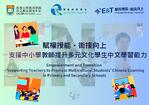Quality Education Fund Thematic Networks - Tertiary Institutes (QTN-T)
This programme is the continuation of the University-School Support Programmes financed by the Education Development Fund. With the experience in research-based pedagogy and classroom practices, the tertiary institutes will provide schools with diversified professional support services to cater for different schools’ development needs. Self-directed Learning as a Strategy to Promote STEAM Education (2023/24)
- Co-ordinator : e-Learning Development Laboratory, Department of Electrical and Electronic Engineering, The University of Hong Kong

To support participating schools in strategic planning and implementation of STEAM-related lessons and curriculum using a whole-school approach; To strengthen curriculum leadership, foster collaboration across STEAM-related KLAs/subjects such as Mathematics Education, Science Education/General Studies and Technology Education; To enhance teachers’ professional capacity in adopting self-directed learning (SDL) as a strategy to promote STEAM education; To strengthen students’ ability to integrate and apply knowledge and skills across different subject disciplines to unleash their innovation, and to help them develop positive values; To provide professional views and technical solutions in field of STEAM including electronics and robotics.
STEAM Education with Self-directed and Progressive Learning of Engineering Design Process for Problem-solving (2023/24)
- Co-ordinator : Department of Science and Environmental Studies, The Education University of Hong Kong

By using self-directed learning as a major strategy, the project aims to develop the capacity of primary and secondary school teachers to promote and implement STEAM education with a stronger connection to the formal curriculum and an strengthened integration across STEAM-related disciplines, and to identify learning elements to facilitate students' progressive development of STEAM knowledge and problem-solving skills through the engineering design process.
Integrated Self-directed Learning Approach to School-based STEAM Development (In-STEAM) (2023/24)
- Co-ordinator : Centre for Information Technology in Education (CITE), Faculty of Education, The University of Hong Kong

To provide support to teachers to enhance their capacity to integrate self-directed learning (SDL) into STEAM education; To develop and implement school STEAM curriculum, and assess effectively students’ learning outcomes so that students are facilitated to integrate and apply the knowledge and skills across different STEAM disciplines; To develop students' SDL, entrepreneurial spirit and 21st century skills through scientific investigation and creative engineering design. The project targets at upper primary (P.4–6) and lower secondary (S.1–3) school students and develops multilevel school leadership networks so as to foster sustainable development of STEAM education in participating schools.
Growth Made Easy: Effective Learning and Teaching of Chinese and Smooth Transition for Multicultural Students (2023/24)
- Co-ordinator : Centre for Advancement of Chinese Language Education and Research (CACLER), Faculty of Education, The University of Hong Kong

This project aims to support the teaching and learning of Chinese and smooth kindergarten-primary transition for K3 kindergarten students and lower primary students from multicultural backgrounds. Schools with any number of multicultural students are welcome to participate.
Empowerment and Transition – Supporting Teachers to Promote Multicultural Students’ Chinese Learning in Primary and Secondary Schools (2023/24)
- Co-ordinator : Centre for Advancement of Chinese Language Education and Research (CACLER), Faculty of Education, The University of Hong Kong

To equip teachers with theoretical knowledge of teaching Chinese as a second language as well as effective blended-learning pedagogies in catering for learning diversity in classroom so as to enhance primary and secondary NCS students’ Chinese language proficiency; To train up curriculum leaders to develop and manage school curriculum for promoting school sustainability; To assist teachers in helping NCS students with their academic and affective preparation for their further study of Chinese in secondary schools; To develop good practices with a solid theoretical ground so as to disseminate the knowledge and experiences and meanwhile maximise their impact; To assist primary and secondary schools in designing systematically the school-based support measures for a smooth transition from primary to secondary education in both academic and affective domains.





